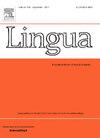“这怎么不符合议会?”:澳大利亚联邦议会中“非议会”语言的元语用
IF 1.3
3区 文学
0 LANGUAGE & LINGUISTICS
引用次数: 0
摘要
议会话语受到高度管制,导致几乎全面避免明确的粗俗或公开的攻击性语言。然而,它仍然充满了成员使用的语言被解释为“非议会”的例子。本研究考察了“非议会”作为元语用标签在1901年至2024年整个澳大利亚联邦议事录语料库中的出现情况,并探讨了如何使用它来实施特定的元语用行为(即通过将谈话标记为“非议会”来做某事),以及它如何成为元语用话语的对象(即本身的辩论主题)。在这样做的过程中,我们探讨了在议会话语中使用攻击性、令人反感或其他无序语言的界限是如何建立、维持、争议的,以及随着时间的推移而变化和演变的。由于澳大利亚联邦议事录构成了一个相对较大的超过9亿个代币的语料库,该研究从计算和解释分析方法中以对话和迭代的方式进行。这种对话形式的分析表明,“非议会”概念所包含的内容比澳大利亚联邦议会的常设程序和相关行为守则所规定的内容更广泛、更复杂。本文章由计算机程序翻译,如有差异,请以英文原文为准。
“How is that unparliamentary?”: The metapragmatics of ‘unparliamentary’ language in the Australian Federal Parliament
Parliamentary discourse is highly regulated, leading to an almost blanket avoidance of explicit vulgarity or overtly offensive language. Yet it is nevertheless replete with examples in which the language used by members is construed as ‘unparliamentary’. This study examines the occurrence of ‘unparliamentary’ as a metapragmatic label across the entire corpus of the Australian Federal Hansard from 1901 to 2024, and probes how it can be used to implement specific metapragmatic acts (i.e. doing something through labelling talk as ‘unparliamentary’), as well as how it can also become an object of metapragmatic discourse (i.e. a topic of debate in its own right). In so doing we explore how the boundaries of offensive, objectionable or otherwise disorderly language use in parliamentary discourse are established, maintained, contested, as well as change and evolve over time. As the Australian Federal Hansard constitutes a relatively large corpus of more than 900 million tokens, the study draws in a dialogic and iterative manner from both computational and interpretive methods of analysis. This dialogic form of analysis indicates that what is encompassed by the notion of ‘unparliamentary’ is broader and more complex than what is prescribed in the Standing Orders and associated codes of practice of the Australian Federal Parliament.
求助全文
通过发布文献求助,成功后即可免费获取论文全文。
去求助
来源期刊

Lingua
Multiple-
CiteScore
2.50
自引率
9.10%
发文量
93
审稿时长
24 weeks
期刊介绍:
Lingua publishes papers of any length, if justified, as well as review articles surveying developments in the various fields of linguistics, and occasional discussions. A considerable number of pages in each issue are devoted to critical book reviews. Lingua also publishes Lingua Franca articles consisting of provocative exchanges expressing strong opinions on central topics in linguistics; The Decade In articles which are educational articles offering the nonspecialist linguist an overview of a given area of study; and Taking up the Gauntlet special issues composed of a set number of papers examining one set of data and exploring whose theory offers the most insight with a minimal set of assumptions and a maximum of arguments.
 求助内容:
求助内容: 应助结果提醒方式:
应助结果提醒方式:


